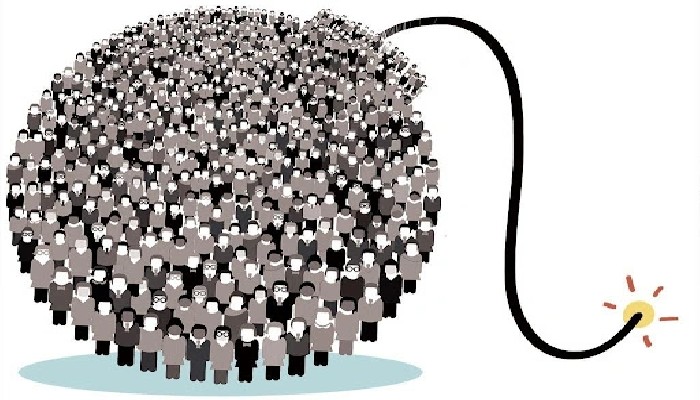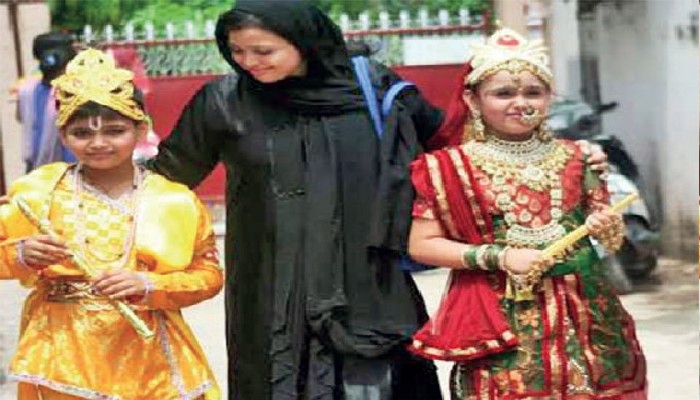In a recent article, the New York based news outlet tried to convey a message that political outfits close to PM Modi’s party are pressuring the government to enact a population law in order to control increasing rise in population in the country
Claim:
Bloomberg said a Hindu group linked to Prime Minister Narendra Modi’s party called for a national population policy that appeared aimed at minority Muslims, stoking religious tensions ahead of two key elections in Gujarat and Himachal Pradesh.
Counterclaim:
According to the World Population Prospects 2022, released by the UN Department of Economic and Social Affairs (UNDESA) in July, India will surpass China as the world’s most populous country by 2023. India’s population will reach 1.428 billion on July 1, 2023. This will push the country to the top of the population ranking, with a peak figure likely being hit in 2064 when it is predicted to have 1,697 billion people. With this burgeoning population, India will face huge challenges in meeting resources.
It will lead to deepening of poverty and rise in unemployment; it will put a massive burden on infrastructure like health care, education, housing, water supply, sanitation, power, roads and railways; it will lead to more pollution, generation of more toxic waste and destruction of the biosphere, excessive deforestation and land degeneration; it will lead to rise in social problems. Several experts and political leaders have expressed concern over the prospect of population explosion in the country.
In fact, since 1947, the two-child policy has been presented in the parliament over 35 times. But unfortunately, the population control issue is seen through the prism of Hindu and Muslim religions. Some vested interests, including ‘Bloomberg’ have attempted to link it with vote bank politics even as the country is bursting at the seams in availing resources to its ballooning population. Since 1991, India has been adding 17 million to its population every year on an average.
That means it is adding the population of the Netherlands every year to its already vast population. In this regard, if someone calls for a national policy on population, what wrong he or she has done. It is the right of every sane Indian to protect and preserve the national interest of the country. Bloomberg is unnecessarily seeing the riot in Indians’ demand for a national population policy.
Claim:
Bloomberg said the push to change laws signals rising anti-Muslim sentiment in the country and the power of Modi’s party to implement a Hindu nationalist agenda. It has taken a series of steps targeting the minority population since Modi extended his power with a stronger mandate in 2019
Counterclaim:
Without gainsaying the fact that the author of the Bloomberg story is unknown to the ground reality. According to a Pew Research Centre study, between 1951 and 1961, the Muslim population expanded by 32.7 per cent---11 percentage points more than India’s overall rate of 21.6 percent. The Washington DC-based non-partisan think tank, however, said this gap narrowed. From 2001 to 2011, the difference in growth between Muslims (24.7 per cent) and Indians overall (17.7 per cent) was 7 percentage points. Since the 1950s, Indian governments have worked with international agencies to promote a range of birth control methods. Since the late 1990s and early 2000, many Indian state governments restricted political eligibility of candidates with more than two children.
Over the period, as many as 11 states have passed laws disqualifying candidates with more than two children from contesting panchayat elections. In 2000, when Congress leader Digvijay Singh was Madhya Pradesh Chief Minister, the two-child norm was made mandatory for the employees of the state government and the same rule is in vogue in the state. However, the Madhya Pradesh government under Shivraj Singh Chauhan in 2006 abrogated the rule that barred politicians having more than two children from contesting panchayat elections.
But with this, concern for population control has never diminished in India. Constant efforts have been made to promote the concept of the two-child norm. Yet it is outrightly wrong to say that since the arrival of Narendra Modi in power in 2014, India has been seized with cacophony around population control. Rather the fact is the Modi government has clarified its stand on population control. The Union Health Ministry said it is not considering any proposal like a two-child norm.











 Contact Us
Contact Us
 Subscribe
Subscribe
 News Letter
News Letter
 Instagram
Instagram Youtube
Youtube